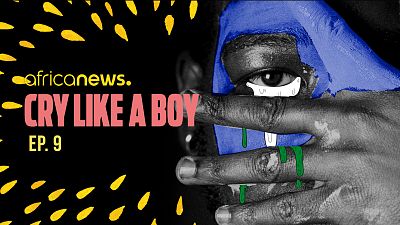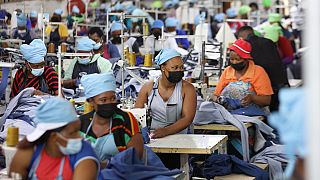Lesotho
Would you give up your life for the good of your family? What if you don’t have a choice?
Somewhere in Africa, thousands of men move from their home country to another to try and find work.
We are in Lesotho and here, men are employed by criminal gangs in the mining industry. They can spend days, months underground digging for gold and minerals. But some never come out. But when you’re a man in this country, you’ve got to provide, you’ve got to find a way.
Home of some of the world’s largest reserves of gold and platinum, South Africa counts thousands of men working illegally in this industry and in inhuman conditions. They also give up their dreams and suffer in silence from a double trauma: abused by fellow miners abroad and they also end up rejected by their families if they come home empty-handed.
But why are these men sacrificing their lives? And what happens when they decide to return home?
Cry Like a Boy is an original podcast series that aims to promote a cross-border discussion on gender roles from the perspective of five African countries (Burundi, Senegal, Lesotho, Guinea, and Liberia), but also from the perspective of African men challenging archaic norms.
Please do not hesitate to listen and subscribe to the podcast on euronews.com or Castbox, Spotify, Apple, Google, Deezer, and give us a review.
TRANSCRIPT | Banna Ba Maninara in Lesotho: Brothers of darkness
Danielle Olavario: It’s September and five men are sitting under a giant pine tree. We’re in Mapoteng, a small town north of Maseru, the capital of Lesotho.
It is past 11:00 in the morning, and the sun is scorching hot. The heat is unbearable. Not even the wind from the west offers relief.
The men respond to the names of:
Thabang Matsora, Masilonyane Tsehla, Chale Khama, Tseliso Nkeeane, Chokotsi Mokoma
They are not related but consider themselves brothers. Brothers of darkness.
They are BANNA BA MAMAENARA - “miners” in Sesotho, the local language of Lesotho.
The fate of miners is a universal one. To be breadwinners. To take care of their families.
For decades, this has been the sound of their daily lives...digging and shoveling all day.
These sounds once accompanied Thabang Matsora’s life in the mines. He retired in 1985, and is now helping other ex-miners get by.
For him working underground was a life choice. Possibly, the only one available. But Thabiso had other dreams. He wanted to be a lawyer and, he says, speak on behalf of people who have problems. But then something happened.
Thabang Matsora: My father retired from the mines when I was in Grade 6, and I was supposed to proceed with my studies. I then realised that I needed to go to the mines in order for me to provide for my family because there was no other way of making money.
Danielle Olavario: You are about to hear how the pressure to be the sole breadwinner in a family can harm young men and change their destinies.
Welcome to Cry Like a Boy. My name is Danielle Olavario and I am a journalist at Euronews.
Cry Like a Boy is an original Euronews series and podcast that explores how the pressure to be ‘a man’ can hurt families and societies. Stay with us as we travel across the African continent to meet men who defy centuries-old stereotypes.
Lesotho is one of the smallest nations in Africa, a kingdom enclave completely surrounded by South Africa. Known as the "kingdom in the sky" it is 1,500 metres above sea level. It is a country rich in beauty, but poorer than neighbouring South Africa. There, salaries are ten times higher.
South Africa is home to the world’s largest gold and platinum reserves. And Lesotho men often emigrate there to be able to provide for their families. Most of them have traditionally worked in the mines, sending their money back home.
Without those remittances, a large number of households would fall deeper into poverty.
To tell you their story, we partnered up with a local reporter in Lesotho.
Pascalinah Kabi: My name is Pascalinah Kabi, I'm an investigative journalist based in Maseru, in Lesotho.
Danielle Olavario: Pascalinah knows her way around this mining community. The daughter of a miner herself, she knows just how difficult this way of life can be.
Nowadays, the life of a Lesotho miner in South Africa is much harder.
In years, mining companies have closed down risky or unprofitable operations, and the mining business has sharply declined. Many mines have shut down or have been abandoned, but people keep digging in these forsaken mines anyway.
So, nowadays, Lesotho miners don’t work in legal mines, but in clandestine ones.
And this is why they don’t really want to talk openly about their jobs.
We try to contact several of them. Almost all refuse.
All, but one.
We are going to call him Relebohile Mololo. It’s a very common name down here. It’s not his real name, and the voice you are about to hear is not his real voice.
He fears for his safety.
Relebohile Mololo: I cannot remember when I started but I left the mines last year.
Danielle Olavario: Pascalinah asked him: What pushed you to go and work there?
Relebohile Mololo: I was struggling, I wanted money. I was scared but there was nothing I could do because I wanted money. I went underground.
Danielle Olavario: Pascalinah explains how it works.
Pascalinah Kabi: For some time, he worked on the surface, sleeping under the stars in the bushes. It took him a while to find the right person, who would hire him to work underground. But he eventually made it and started working in a gold mine as a zama-zama, an illegal miner.
Danielle Olavario: In the world of zama-zama, there is no underground elevator, or “birdcage”, as miners call them. Instead, men all go down into the mines through a narrow hole in the dirt dug by other illegal miners.
**Pascalinah Kabi: **He told me that there are thousands of zama zama working underground at the same time. It’s like a human anthill.
Danielle Olavario: The miners spend months underground at a time, in the heat and in the dark.
They have no headlights, just a hand torch. If it switches off, miners are advised by other zama-zama not to take any step further, but to sit down calmly and wait for someone to come to the rescue.
Down there, it’s total darkness. And the temperatures can reach 50 degrees celsius.
The heat is so unbearable that people are forced to go around half-naked in the mine.
Relebohile Mololo: We passed each other naked and went on with our business
Danielle Olavario: Here’s Relebohile Mololo again.
Relebohile Mololo: My whole body was sore after my first sleep underground. I slept sitting down and it was not a comfortable spot at all. But as time went on I got used to sleeping sitting down.
Danielle Olavario: No one ever bathes or changes his clothes.
The zama-zama just keep digging, as days and months go by.
The longest Relebohile Mololo spent underground without ever coming back to the surface was: 4 months or 120 DAYS or 2880 HOURS.
All without seeing any daylight.
After all this time, Relebohile Mololo manages “to sell his product”, gold, for 7 thousand Maloti.
Four months of his life are worth about 350€.
In Lesotho, the cost of living for a family of four is 3 thousand Maloti, or 167€ per month.
With this, he’s able to care for his family.
He doesn’t like to talk about the sacrifice he made. Just like the majority of these miners, he keeps it to himself.
**Pascalinah Kabi: **Because for them, it’s all about their family.
Danielle Olavario: Here in Lesotho, the mining business began to flourish in the 50s. In 1986, there were 157,000 Lesotho nationals working in South African mines, about 10% of the entire population.
People like Pascalinah’s father, or the five men we met at the beginning, were lucky enough to have survived the mines and retired. They used to work in legitimate mining businesses, legally.
One of them is Chale Khama, now 78.
He spent much of his youth underground. He began working in the mines in 1960. Back in the day, all roads led to South Africa.
Then he retired in 2000.
But once miners stop working, things get harder. No matter if they worked in the mines legally or as zama-zama, illegally.
As a retired man, Chale has little benefits.
Chale Khama: We are constantly fighting over money. Not being able to provide for my family as I used to have to some extent affected the way I am perceived as a man... but as a Mosotho man I must stay strong.
Danielle Olavario: Mosotho is the main ethnicity of Lesotho. And here, a local adage says that men do not cry.
"Monna o tśoana le nku ha a lle." As we say here, loosely translated just like a sheep, men don’t cry.
We spoke to a member of the Lesotho parliament called Tlohelang Aumane. He represents the constituency of Semena, an area where many left to work in South African mines.
Aumane tells us about this constant pressure to provide for their families that men feel here. Women, he said, could spend time crying…
Tlohelang Aumane: But for men, they have to make sure that life goes on, and after those women cry and those kids cry, they will want food. So you have to put something on the table.
Danielle Olavario: It’s like going to war, he says. Literally.
This idea of being a breadwinner, or the person who brings food to the table for the whole family, is deeply rooted in many cultures. And it is a lot more deeply ingrained than many progressive couples would like to admit.
According to a 2019 study carried out in the US, being the “man of the house” comes at a dire psychological price. Stress and anxiety are at their peak when men are alone in fulfilling this breadwinner expectation at home.
Joanna Syrda, lecturer in Business Economics at the University of Bath, conducted the study and explains that:
Joanna Syrda: There's very little research that talks about what kind of stress is entailed with being the sole breadwinner. And, you know, kind of the lack of research is symptomatic in itself because in academia, we research new phenomena, changes, new trends. So that really shows you how persistent and how durable that construct of a male breadwinner is. If there's so little research about this.
Danielle Olavario: Her study shows how the pressure to be “a man” can damage an entire society. It is a pressure that men around the world can relate to:
**Joanna Syrda: **Part of the problem of the stress that comes with also being the sole breadwinner is that masculinity is defined by strength and might preclude somebody from admission to vulnerability.
Danielle Olavario: When you add poverty to the mix, things can turn sour pretty quickly.
Such is the case in Lesotho, and also in many European countries where male breadwinners take care of their families.
The story of Lesotho miners is no stranger to Europe.
Danielle Olavario: Recognise this song? It was recorded in 1959 by Italian-Belgian songwriter Rocco Granata. It tells the story of a young man falling in love with a girl called Marina and wanting to marry her as soon as possible.
Born in the south of Italy, he emigrated to Belgium following his father when he was 10, after World War II.
Rocco’s father was a coal miner.
At that time, in 1946, Belgium and Italy had signed a pact. Manpower in exchange for coal.
For the first years, Rocco’s whole family lived in the barracks within former concentration camps. The barracks had been modified to accommodate foreign miners. People like Rocco’s father were deported for economic reasons. Their country had sold them to Belgium for a few bags of coal.
Italian author Toni Ricciardi, professor of migration history at the University of Geneva, explains how the male-dominated mining sector has progressively become a marginal sector of the economy.
Toni Ricciardi: Especially in the mines, there is always someone who is the lower of the lowest. He’d come and take his place.
Danielle Olavario: In colonial times, thousands of Europeans crossed borders to work in the mines.
Countries like Germany began recruiting so-called “guest workers” to work in the Ruhr region. They were Italian, Spanish, Turkish, and Polish.
Just like our Banna Ba Mamaenara - our miners in Lesotho, European men left their families behind.
They thought it was going to be just a temporary sacrifice, too.
Toni Ricciardi: This is a common thread in centuries of migration phenomena: whoever leaves, except extra-rare cases, leaves thinking it is temporary, imagining 5 or 10 years of savings or sacrifices to provide for a better living for his family waiting at home.
Danielle Olavario: When these European miners would come back home for holidays, they needed to impress everyone back home. And they wouldn’t speak too much about their sacrifice. Just like today’s miners in Lesotho.
Toni Ricciardi: No one asked how is work, how do you live? Well, we live well. Many did not find it easy to tell these stories to their children and to their grandchildren. It is complicated. More than toxic masculinity, here, toxic is the code of silence.
Danielle Olavario: This toxic code of silence keeps these men from sharing their experiences, and from healing for future generations.
It happens everywhere in the world.
What is generally untold in the pages of history books are the stories of those left behind, generally women and children.
In the next episode, we will travel to a very special place in Lesotho, a district where you can barely see men around.
A place where women have been left behind to take care of their families while men are tasked to be the breadwinners in the mines.
CREDITS:
In this episode, you heard the song Marina by Rocco Granata, originally recorded in 1959. We also used music by Lesotho artist Selimo Thabane. You can check out his work at selimothabane.org and follow him on Facebook, Instagram, and Youtube as Selimo Thabane.
For more information on Cry Like a Boy, a Euronews original series and podcast go to our website to find opinion pieces, videos, and articles on the topic. Follow us @euronews on Twitter and @euronews.tv on Instagram.
Share with us your own stories of how you changed and challenged your view on what it means to be a man. Use #CryLikeABoy. If you’re a French speaker, this podcast is also available in French and it’s called: Dans la Tête des Hommes.



















Go to video
Nelson Mandela International Day 2025: The power to end poverty is in our hands
01:13
South Africa: Eskom targets mainly clean energy sources by 2040
01:17
Trump downplays US State Department's failure to release more Epstein files
01:46
G20 members hope to reach consensus on global financial reforms at Durban meeting
01:13
South Africa: Cape Town best city in the world
02:03
Muhammadu Buhari's legacy: higlight of his presidential tenure